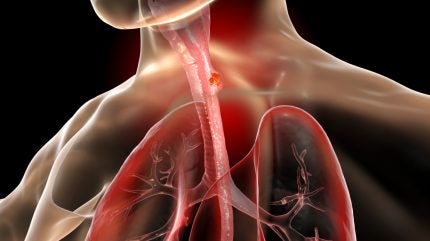
Oesophageal cancer is the 11th most diagnosed cancer and the 7th leading cause of cancer mortality. The disease starts in the oesophagus, the tube that moves food from the throat to the stomach, but symptoms often remain unnoticed until the cancer spreads. The two main types, oesophageal adenocarcinoma, and oesophageal squamous cell carcinoma, develop in different oesophageal regions and are driven by distinct genetic changes.
The prevalence of oesophageal cancer
Oesophageal cancer is more common in men than women, with global Age Standardised Incidence Rates (ASIR) of 7.6 and 2.6 respectively. The overall five-year survival rate is about 20% but varies from 5% to 50% and improves with early detection.
Oesophageal cancer cases are projected to increase significantly, potentially surpassing 923,000 new cases annually by 2050. In 2022, nearly 511,000 new cases and 445,000 deaths were reported globally.
Asia recorded the highest incidence in 2022, followed by Europe, North America, and rest of the world regions. Incidence varied by country, with China, South Africa, the United Kingdom, India, and Japan having the highest rates among others. These diverse trends reflect the complex epidemiological landscape of oesophageal cancer across the world.
Current treatments for oesophageal cancer
The NCCN, ESMO, and the Japan Oesophageal Society provide a range of guidelines for oesophageal cancer treatment. These guidelines aim to tailor treatment strategies for optimal patient outcomes.
The NCCN (2014) recommends oxaliplatin for first-line therapy, with specific regimens for adenocarcinoma and squamous cell carcinoma based on biomarkers. ESMO suggests platinum-fluoropyrimidine chemotherapy with immune checkpoint inhibitors for advanced SCC, followed by nivolumab or pembrolizumab for second-line treatment. The Japan Oesophageal Society advises a combination of 5-FU, cisplatin, and nivolumab/pembrolizumab for first-line therapy, with subsequent options depending on prior treatments.
There are diverse drugs on offer from companies like Advanz Pharma Corp. Ltd, BeiGene Ltd., InnoKeys Pte. Ltd., and Simcere Pharmaceutical Group Ltd. These include both antibody and small-molecule therapies.
Clinical trials and pipeline drugs for oesophageal cancer
Multiple ongoing Phase III trials continue to develop antibody and small-molecule drugs, as well as other innovative modalities. Some examples of the latter are the bispecific or multispecific antibody, and peptide vaccine therapies. These and other research and development initiatives reflect companies’ comprehensive efforts to address oesophageal cancer treatment complexities and improve patient outcomes.
Precision medicine and kinase-targeting therapies, like TKIs and monoclonal antibodies, offer possibilities for overcoming drug resistance and recurrence in oesophageal cancer. Collaboration among researchers, healthcare providers, and pharmaceutical companies holds promise for further progress in disease management and care.
Oesophageal cancer remains a global health challenge, but recent treatment advances have improved patient outcomes compared to previous years. Disparities in global prevalence rates and healthcare infrastructure highlight the need for tailored approaches and strong healthcare initiatives. The use of chemotherapy, targeted therapies, and immune checkpoint inhibitors in oesophageal cancer trials demonstrates the work being done to tackle the disease.
About Novotech
Novotech, a global clinical contract research organisation (CRO), has partnered with numerous biotech companies and completed hundreds of oncology projects, including those in immuno-oncology and advanced therapies for indications such as oesophageal cancer. It supports over 5,000 clinical projects across all phases and bioequivalence studies. Recognised for its contributions, Novotech received the CRO Leadership Award 2023 and has been the Asia-Pacific CRO Company of the Year since 2006.
To find out more about the global clinical trials landscape for oesophageal cancer, download the free comprehensive disease report below.


